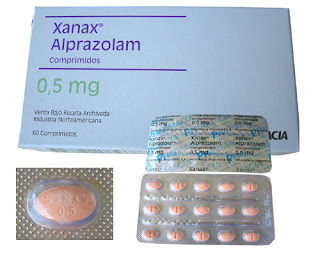
Xanax is mostly prescribed to treat anxiety caused by depression and panic disorders.Xanax belongs to a group of drugs called benzodiazepines which work on the chemiclas in the brain that may cause anxiety and depression.Xanax and other benzodiazepines should not be used in pregnancy as they may cause birth defects in an unborn baby.People suffering from respiratory disorders,kidney or liver disease,glaucoma,addiction to drugs or alcohol should let the doctor know about them before taking xanax.
Xanax should be administered in very less doses to the patients having a history of suicidal thoughts and depression.Xanax increases the effect of alcohol when taken along with it.Since,xanax is habit forming,it should only be used by the person it is prescribed for.Medication like xanax should always be stored in a secure place where other cannot reach to it.Though xanax is available in the internet for sale,it is advisable not to purchase xanax through internet as they may be adultrated and contains dangerous ingredients which when consumed have dangerous side effects.Xanax should not prescribed for anyone under the age of 18 years.Xanax also has dangerous side effects when taken in combination with anti-fungal prescriptions like ketoconozyole or sporanox.
While taking xanax in a tablet form,always remember to swallow the tablet whole and allow it to dissolve in your mouth without chewing.Never crush,chew or break an extended-realease tablet because it is specially made to release medicine slowly in the body.Contact the doctor if the prescribed dose of xanax is not working well in subsiding the panic or anxiety symptoms.If xanax is stopped suddenly, the patient may show withdrawal symptoms like:
* Seizures
* Blurred vision
* A loss of appettite
* Diarrhea
* Muscle twitching
* Poor concentration
* Numbness in the limb
To avoid the withdrawal symptoms, the intake of xanax should be stopped eventually by reducing the dosage day by day.Person taking xanax should be very cautious about there regular dosages.In case of forgeting a dose they should not take two doses of it te next day since an overdose of xanax can be fatal leading to coma and death.An overdose of xanax can cause sideeffects such as:
* Drowsiness
* Loss of balance or Co-ordination
* Muscle weakness
* Fainting
* Coma
Side effects of Xanax:
1.Allergic reaction to xanax may be defficulty in breathing,hives,swelling of the face,lips,tongue or throat.
2.Hyper activity,hostility,hallucinations.
3.No urination or very less urination.
4.Convulsions.
5.Jaundice(yellowing of eyes and skin).
6.Muscle twitching.
7.Suicidal thoughts
8.Depression
9.Fearlessness,risk taking behaviour.
10.Loss of appitite
11.Nausea.
12.Temporary loss of memory(amnesia)
13.Irritability
14.Insomnia
15.Increased sweating.
It is of utmost emergency if the serious prevail in the patient and the doctors medical advise is needed to treat the side effects.Xanax when taken in combination with certain incompatable drugs cause serious side effects.Hence,never take anyother medicine along with xanax with out the prescription of your doctor.
Note:This information about xanax is only for awareness of the drug and its side effects.It is not intended to cover all the information about xanax.If you have questions about the drug check with your doctor or pharmasist.
